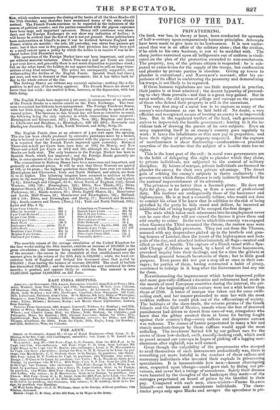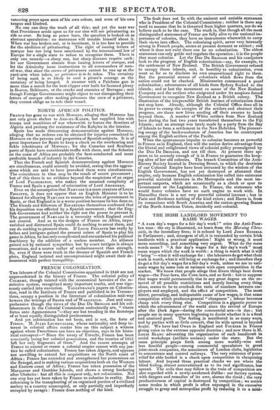TOPICS OF THE DAY.
PRIVA TEE RING.
ON land, war has, in theory at least, been conducted for upwards of half-a-century upon comparatively humane principles. Attempts have been made to give laws to its lawlessness. It is now under- stood that war is an affair of the military alone • that the civilian, if he stick to his own business, is not to be meddled with. The sharp justice exercised upon all belligerents out of uniform is vindi- cated on the plea of the protection extended to non-combatants. The property, too, of the private citizen is respected : he is sub- jected to extra-levies for the supply of the troops, but confiscation and plunder by private parties is obsolete. Giving up towns to plunder is exceptional ; and NAPOLEON'S maraude, after his ex- perience of its effect in embittering the peasantry and demoralizing his troops, is not likely to be repeated.
If these humane regulations are too little respected in practice, their justice is at least admitted ; the decent hypocrisy of pretend- ing to obey them prevails— and that is a great step gained. But in naval warfare, the old system of pillage and outrage on the persons of those who defend their property is still in the ascendant.
The very first step of a naval war is to capture as many of the enemy's merchantmen as can be laid hold of. No doubt, a very efficient and recognized means of beating an enemy is to impoverish him. But in the regulated warfare of the land, each government strives to impoverish the hostile government ; leaving to it the in- vidious task of drawing the purses of its own subjects. Even an army supporting itself in an enemy's country goes regularly to work : it taxes the inhabitants so that men pay in proportion, and have their rights of private property respected. But the capture of merchantmen is sheer freebooting—confiscation—a practical assertion of the doctrine that the subject of a hostile state has no rights.
This is the least part of the evil : in naval wars governments are in the habit of delegating this right to plunder which they claim, to private individuals, not subjected to the control of military discipline. By letters of marque, private individuals are licensed to - plunder the enemy for their own private advantage. The direct gain of robbing the enemy's subjects is theirs exclusively : the government which forms this alliance is only indirectly benefited by the national impoverishment of its adversary. The privateer is no better than a licensed pirate. He does not fight for glory, or for patriotism, or from a sense of professional duty. His motives are undisguisedly those of the buccaneer and highwayman. He is at best a cowardly robber, who would not dare to commit his crime if he knew that in addition to the risk of being pistolled by the party be bids stand and deliver, be incurred an additional risk of being hanged if he escaped the first danger.
The state which takes such miscreants into its employment never can be sure that they will not exceed the licence it gives them and add cruelty to crime. In the war in which this country was engaged when GEORGE the Third mounted the throne, the narrow seas were crammed with English privateers. They ran out from the Thames, manned with any desperadoes picked up in the brothels and gam- ing-houses of London, then the resort of the highwaymen and foot- pads of the day, and attacked indiscriminately all flags—neutral and allied as well as hostile. The capture of a Dutch vessel with a Spa- nish Chargé d'Affaires on board, by a band of these buccaneers, provoked inquiry into their dealings, and for a time the gibbets at Blackwell groaned beneath hecatombs of them; but to little good purpose. Even peace did not put a stop all at once to their out- rages ; for parties of them, having contracted a habit of piracy, continued to indulge in it long after the Government had any use for them.
Notwithstanding the improvement which better improved police and more generally-diffused education and refinement had made in the morals of most European countries during the interval, the pri- vateers of the beginning of this century were not a whit better than those of 1760. A letter of marque was taken out for some swift- sailing craft, and her master proceeded to man her with the most reckless ruffians he could pick out of the offscourings of society. The habitués of the slave-trade, the veteran pirates of the Greek Islands and the Gulf of Mexico, rascals whom the fear of deserved punishment had driven to desert from men-of-war, renegadoes who knew that the gibbet awaited them at home for having fought against their country's flag—every callous and desperate outcast was welcome. The scenes of horror perpetrated in many a fair and stately merchant-barque by those ruffians would appal the most unfeeling. The inveterate hatred felt by our gallant tars for the crews of those low-decked, swift, rascally-looking craft, which used to prowl around our convoys in hopes of picking off a lagging mer- chantman after nightfall, was well earned. Great though the culpability of the governments who stooped to avail themselves of such instruments undoubtedly was, there is something yet more hateful in the conduct of those callous and mercenary individuals who invested their capitals in privateering speculations. It is inconceivable how men—decent churchgoing men, respected upon 'change—could grow rich by fitting out pn- vateers, and never feel a twinge of conscience. Surely their dreams were haunted by the thoughts of the bankrupts they made—of the outrages perpetrated on board of prizes by the banditti in their pay. Compared with such men, slave-traders—Pznao BLAB:co himself—are humane and considerate individuals. The slave- trader preys only upon Blacks and savages the speculator in pri- vateering preys upon men of his own colour, and even of his own tongue and kindred.
No one can deny the truth of all this ; and yet the next war that Providence sends upon us for our sins will see privateering as rife as ever. So long as peace lasts, the question is looked on as abstract speculation : no statesman will trouble himself about it. When war has broken out, or is imminent, it is too late to provide for the abolition of privateering. The right of issuing letters of marque has too long been sanctioned by the international law of Europe for a single state to refuse to recognize them. There is only one remedy—a sharp one, but sharp diseases require such : let our Government abstain from issuing letters of marque, and let the Admiralty issue instructions to all commanders of men- of-war, that since the crews of privateers cannot be run up at the yard-arm when taken, no privateer is to be taken. The certainty of being sunk is as likely to cool a pirate's courage as the certainty of being hanged. A steamer with a Paixhans gun is more than a match for the best clipper ever built for licensed piracy in Boston, Baltimore, or the creeks and crannies of Bretagne ; and though Foreign Governments might object to our disregarding their letters of marque after making prisoners the crew of a privateer, they cannot oblige us to take their vessel.



























 Previous page
Previous page